Teaching School

Lochmarin
Sun 20 Sep 2015 05:56
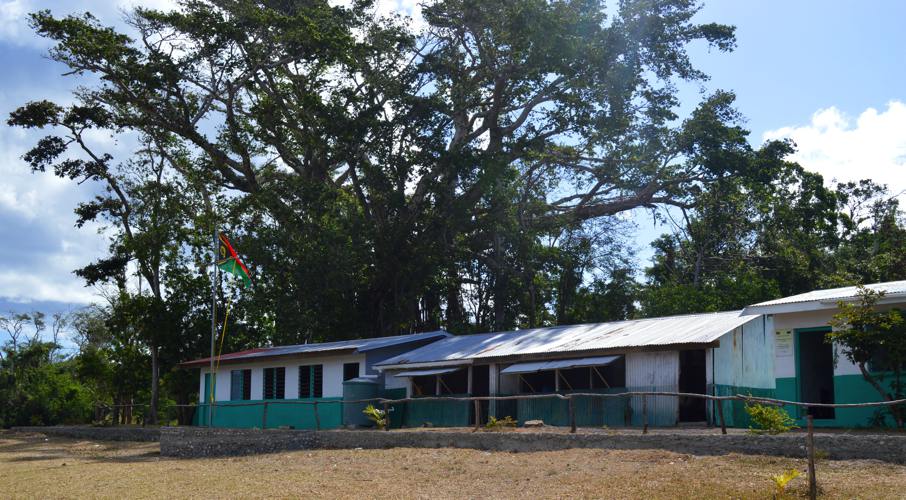 Tassiriki School. 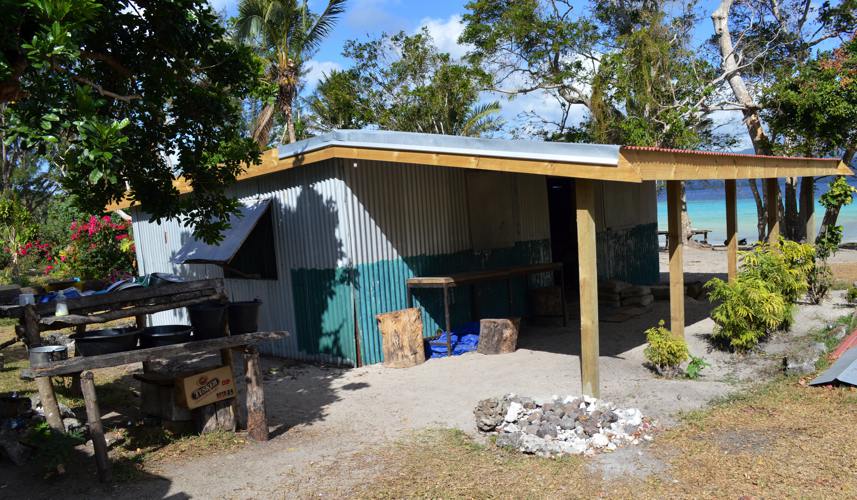 Teacher Anna’s house next to the school - a new roof as cyclone Pam took the last one. On the left is the food preparation / washing up area. 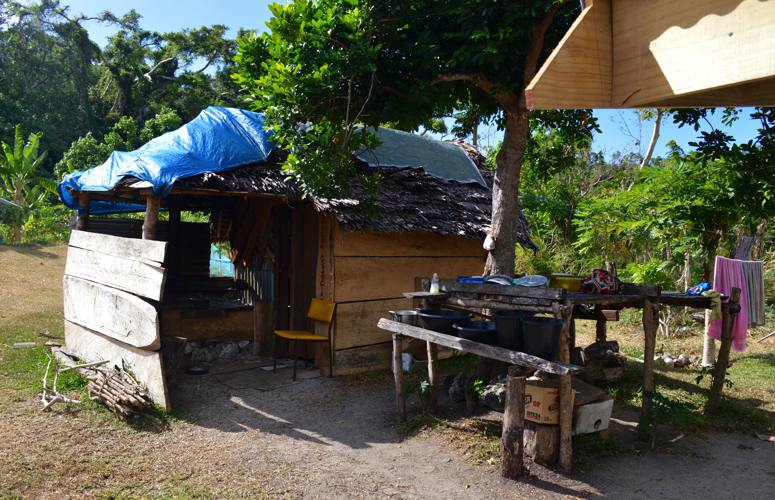 Next to it is the kitchen, tarps still cover the roof after Pam as the branches that are needed to replace the thatch haven’t yet grown back. 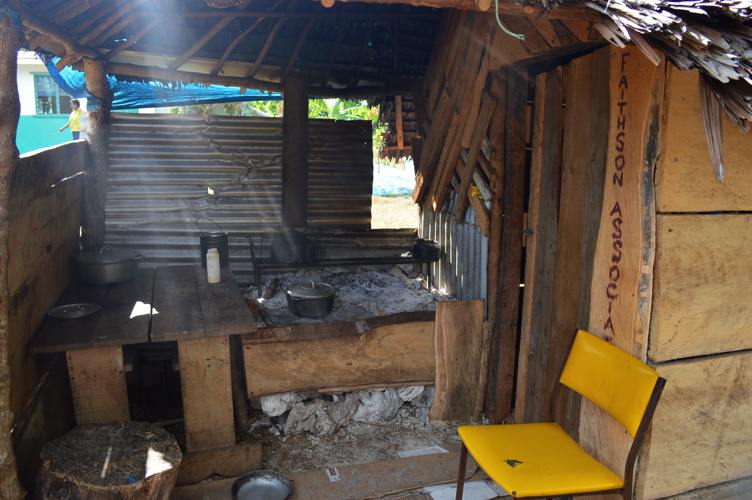 Here’s the cooking hearth, the fire is built up on big coral rocks, retained by the plank, so it’s table top level, easier to work at. Whilst Anna led devotion more students arrived in dribs and drabs, with no sense of urgency or being late. Teacher Paul still wasn’t there so I suggested I take the older children next door into his class room, whilst Anna kept the younger ones that she usually taught. I ended up with the 10 to 14 year olds so I introduced myself and, as this involved explaining where I had come from, decided to teach Geography. I started by asking the students to tell me where was the furthest they had traveled to. Some had been to Port Vila, about 30km away, and one had been to Tanna, two islands down the chain. That was it. There was a world map on the wall so we found where the UK was and I traced our route for them. Trying to bring across some sense of scale, of the size of the world drawn on the map was very difficult, they guessed it had taken us maybe three days to sail from England. We identified continents and some of the larger countries, shared what we knew already and learnt some facts about each one. I tried to make it a game - when I said Australia they had to bounce like kangaroos (we diverted to discuss marsupials), when I said America they had to mime eating hamburgers (their ‘fact’ about Americans, not mine! We discussed stereotyping, don’t worry), when I said Brazil, they danced etc… 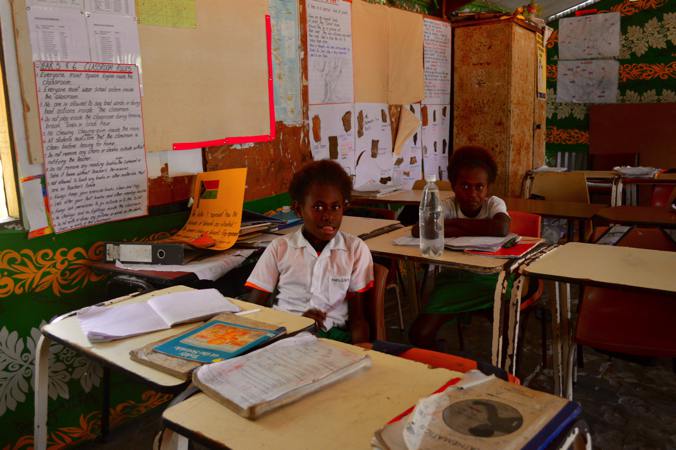 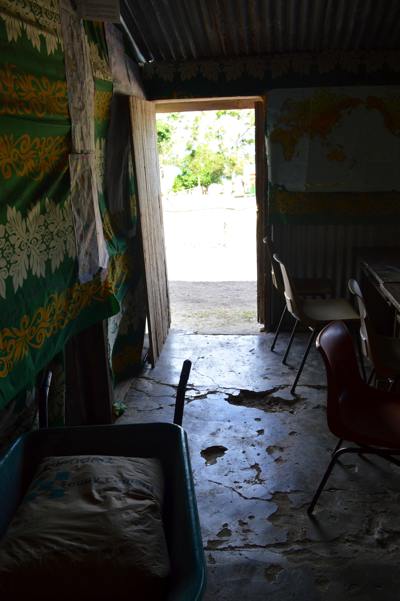 Two of the younger students in ‘my’ class and repairs in progress at the back of the room. The hardest thing was getting the students to talk. They all spoke English but as a third language after their own language, then Bislama. They were used to English in the classroom, indeed the first rule on the list posted up on the wall was “Everyone must speak English inside the classroom.”, whilst number 7 was “No stealings and no fightings inside the classroom.”. But they were shy, and I had to use every trick in the trade: getting them to talk with a neighbour practising what they were going to say first; asking really simple questions that one couldn’t possibly get wrong; asking open questions, with no wrong or right answer; getting them to ask another student if they were unsure and finally insisting that everyone ask one question, with two minutes to think it up, two minutes to practise with a friend, and even then skipping over, but returning to, students who couldn’t bring themselves to talk when their turn came! The questions were things they wanted to know about England. They made me look afresh at our country: Do we have markets? I thought of the daily market in Port Vila, then the Wednesday market in Dorchester, not quite the same; Do we have many languages? Tanna alone has 13 different languages, but we have Welsh, don’t we? and Cornish and Irish and.. does Scotland have one? I certainly can’t understand them at times!; Do we have Kastom? Well, we have traditions I suppose, but not like Kastom is here, meaning the way of life before Missionaries and White influences; Do we have cars? You bet we have cars! In fact some families have more than one car! Students were still arriving, slipping into their seats quietly, picking up where we’d got to. At some point Teacher Paul arrived in school. I know because he put his head in the window and passed in a globe. He must have been listening in, but saw no reason to intervene, and decided to pass in the globe that was stored in his office. That made it much easier to explain why the UK was on the world map twice, once on the far left, once on the far right. Vanuatu was, quite rightly, in the middle of the map. Eventually I felt I’d done quite enough of ‘speaking and listening’ and it was time we wrote something down. The students all took out their exercise books, I wrote the date and a title on the board for them to copy and got them all to decide on somewhere they would like to travel to and then to write a sentence explaining where it was and why they wanted to go there. Clearly, there was a large amount of differentiation needed in a class that spanned 5 years, the less able copied and filled in the gaps “I would like to go to ….. because I will see …. there.” The more able tackled it on their own then had to study the globe and world map to find a place it would be very cold to live in, then one where it would be very hot (we’d ended up having to talk about seasons during our discussions as I found myself mentioning winter and summer and then realised that here in the tropics they don’t have them. Just wetter months and times when cyclones are more likely). I was beginning to despair of keeping the faster ones occupied, whilst encouraging the slower one and prodding the lazy ones and marking the finished ones, when Teacher Paul reappeared. Some medics were visiting the village, they wanted to talk to all the children. So we dropped everything and returned to Anna’s classroom. The medics gave the children a talk on looking after their teeth: brushing three times a day, rinsing with water after you eat ‘lollies’ or sugar. They had pictures and tooth brushes as visual aids so I was able to follow most of the talk, which was in Bislama. This was my first experience of Bislama in a formal setting- fascinating! They finished up with a song in English “Brush brush brush your teeth, keep them nice and clean” to the tune of ‘Row row row your boat”. After the talk the team wanted to check the sight and hearing of class 1 and 2, Anna’s class, but for the rest it was break time so out we all went to play. There were about 80 students in school now, some of them stayed to watch the little ones being checked but the rest seemed to vanish. It turned out that most of them were in the banyan tree. 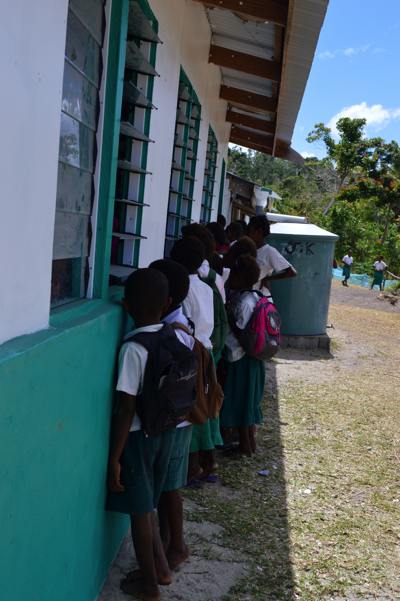 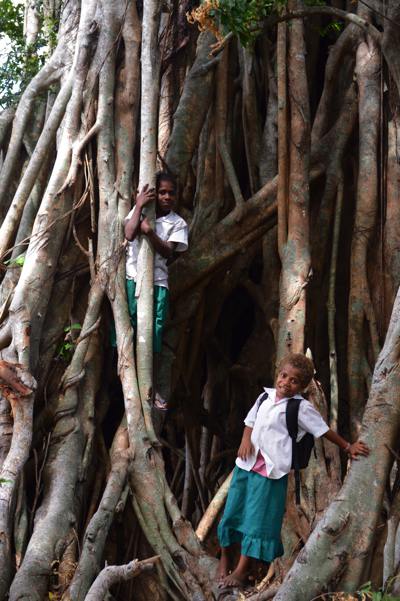 Watching the medics at work, who needs a jungle gym when you have a tree like this?  Building a seat ready for lunch time, hammering poles cut with their own ‘bush knives’ (small machetes) into a buttress root, using lumps of coral as hammers. 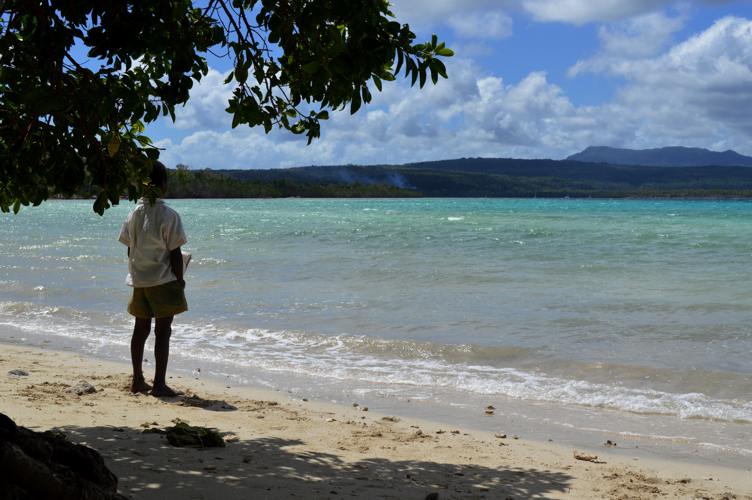 Fancy having this view at break time? Half way through break the air was filled by excited cries from the children. The little ones were all chanting at the tops of their voices, pointing out to sea and climbing to get a good view: “Sea cow! Sea cow! Sea cow!” A dugong was grazing in the shallows in front of the school. 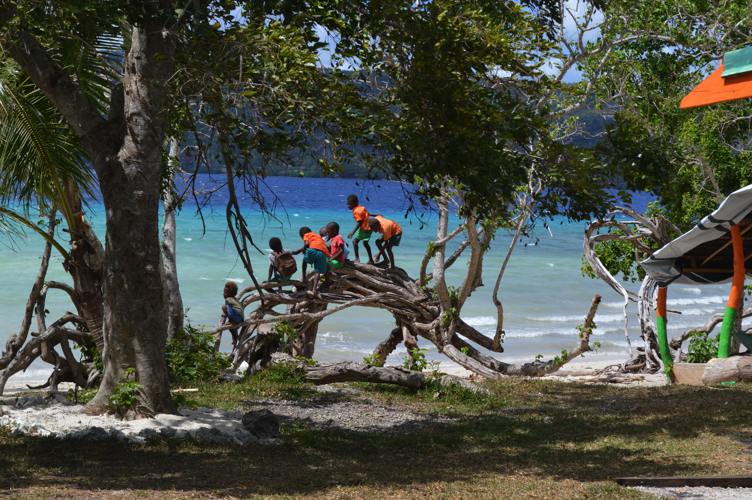 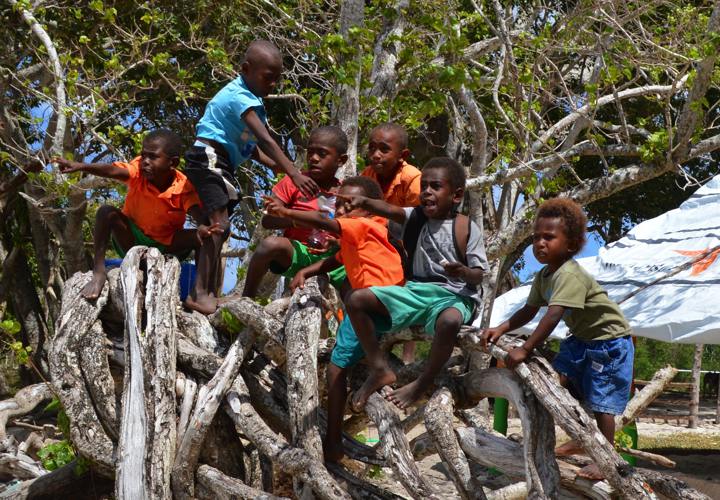 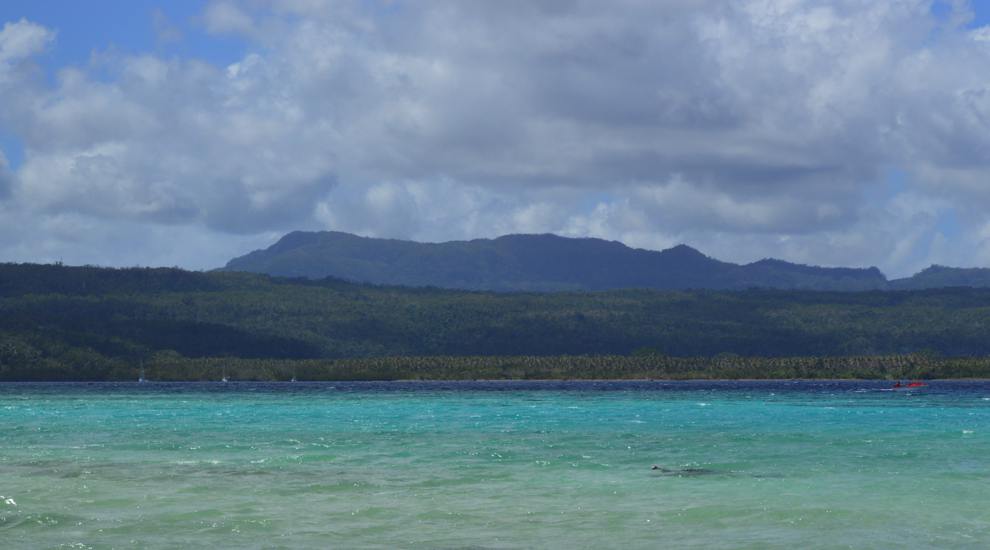 The shadow on the right in the foreground is the dugong, he’s just putting his snout up out of the water, Lochmarin is at anchor across the bay, the left hand boat. After break we set aside our writing and started on some maths. There had been fractions written up on the board when I arrived, addition, subtraction, multiplication and division of fractions, heady stuff for ten year olds. I asked if they had all been studying it or just the older ones? They’d all been doing it. So I decided to go back a couple of steps and see what they understood. What were fractions? Give me an example of a fraction? What did the top number mean, what did the bottom number mean? We were deep in the thick of this and working up to being able to order fractions (which is bigger? 3/4 or 5/8 ?) when we were told it was 11:30, lunch time. Oh well. They said their lunch time prayer, I collected in the writing to finish marking and dismissed the class. Interestingly, the most frequent correction I had to make was to plurals - a missing ’s’ on the end of words. I found out later that in Bislama they don’t use ’s’s to mark plurals. A “puskat" is just one of them, “ol puskat” (literally "all puskat”) means more than one, and “olgeta puskat” (literally "altogether puskat”) means all of them or “evriwan” of them! No wonder those ’s’s in english are confusing. I found after I had done my marking that Kalo’s kids had gone on so I meandered back with some of the older girls from my class. They were singing as they went, beautifully, I didn’t understand the words but it was in three parts, maybe from church. After a while I burst out laughing: they were all singing a wonderfully contemptuous version of the brush your teeth song, ironically doing the actions as they walked. They thought it as bad as I had! On the way to Kalo’s house I passed Teacher Paul. He explained it was sports afternoon, and so I assumed he wouldn’t need me? No, he certainly did need me. Ok, well what equipment did they have? Two balls, but one was punctured. Right. I’d need to do some thinking during lunch. As it happened I didn’t get any time for lesson planning. I was given a wonderful meal, rice salad, meat stew, cassava, and after that Kalo needed help. He had been given an old iphone, he needed to know how to use it. An intensive training program ensued. As I headed back to school Teacher Paul stopped me to say he was going to the clinic to get his eyes checked, he’d be along later. Anna was waiting when I returned though, ready to start school. I caught up with some of the boys I had taught drinking coconut water and eating jelly nuts (green coconuts: the flesh is soft to eat, you scoop it out with a piece of shell, and is wonderfully sweet). They had climbed a tree and cut down the nuts with their bush knives. I guess it’s the equivalent of picking blackberries? 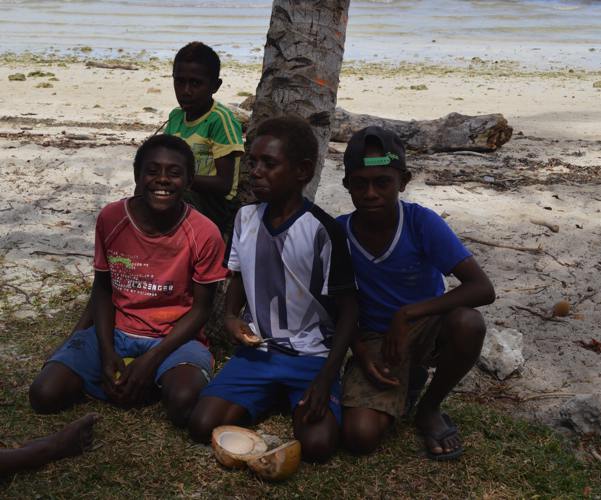 We had about 75 students, aged from 6 up to 14. Anna asked me what I was going to do and I told her I’d think of some games to play with them, assuming she’d have the younger ones, I’d have the older ones again. But no, Anna called the children closer “Teacher Sara will show you all a game!”. 75 kids, a field, blazing sunshine, and not even the two balls, punctured or not, as they were locked in Teacher Paul’s office. We did fine. We played ‘stuck in the mud’, because I came from muddy, rainy England and ‘port and starboard’, because I lived on a boat, and alternated with circle games in the shade of the Banyan tree to cool off. Anna had just explained to me that we needed to stop early because it hadn’t rained when Teacher Paul turned up to lead the final prayer of the day and dismiss the students. I should explain. The village drinking water is rainwater, collected from the tin roofs into tanks. It hadn’t rained for weeks so everyone’s drinking water was running out, the school’s was nearly gone (Anna kindly gave me some from her private supply) so students couldn’t be expected to run around the field all afternoon with no water to drink and school finished an hour early. A team with a small de-salination plant were due to visit the village the next weekend to help out. The school kids weren’t all ready to go home though, they had a chore to do before they could return. Each girl needed to collect a bundle of firewood, graded according to size of child, tied with a strip of bark for their mothers to use on the fire to cook the evening meal. The bush knives were put to good use again. 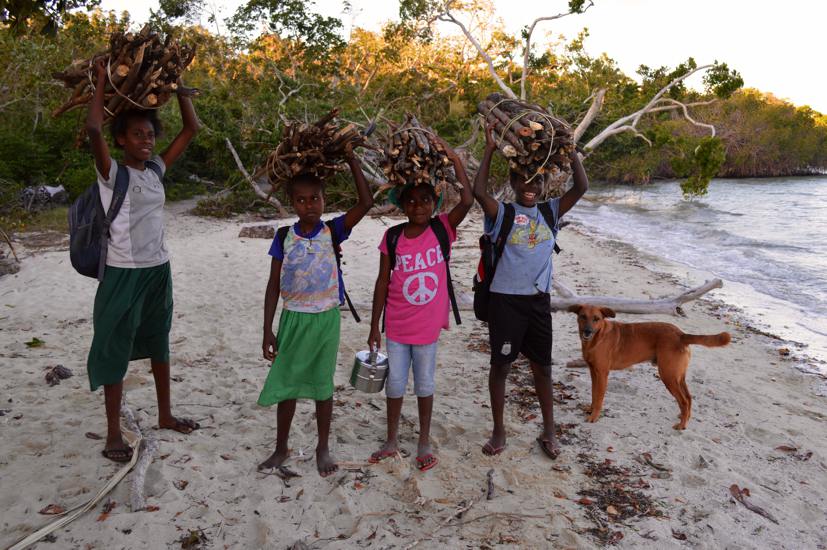 I gathered up my things and set off back to the village so Phil could come in the dinghy to pick me up, I was shattered! So many interactions. As I passed the Headteacher’s office I heard a generator kick into life. I looked in: it was in the doorway so the exhaust would blow out and Paul had hooked up a desktop printer he was using to photocopy some support literature from the medics. “Brush brush brush your teeth, keep them bright and clean… |